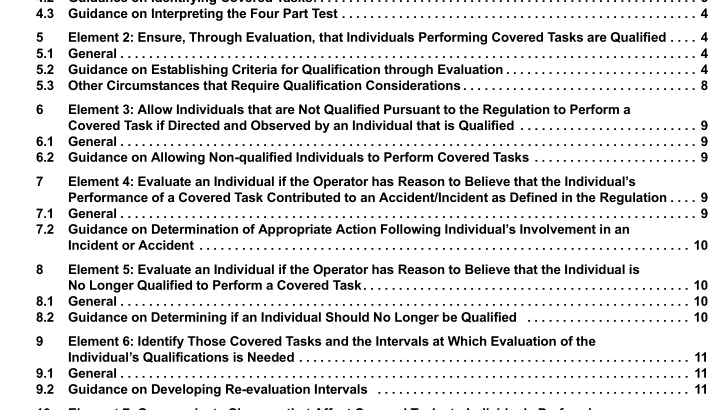API RP 1161:2012 pdf free download.Recommended Practice for Pipeline Operator Qualification (OQ)
4.2 Guidance on Identifying Covered Tasks
4.2.1 General In developing the covered task list, the Operator shall consider tasks performed on the pipeline facility, regardless of who performs them (employees, contractors, subcontractors, or other entities such as other pipeline Operators or those with access to the Operator’s equipment).
For example, if an Operator contracts out pipeline repair activities, those activities shall be considered in the identification of covered tasks. The Operator has flexibility to determine how to accomplish covered task identification. The Operator should document the method and justification for selecting covered tasks. Options for establishing a covered task list may include but are not limited to the following two methods.
4.2.2 Adoption of an Industry-Developed Covered Task List Industry and technical associations, qualification product providers, and others have developed covered task lists through subject matter expert consensus. The Covered Task List developed by API (in conjuction with the Operator Qualification workgroup under the Pipeline Committee) is attached to this document as Annex A. The Operator should take additional steps if adopting such a list and at a minimum, should compare the covered task list to its operations and maintenance activities in order to ensure completeness. The Operator has the flexibility to combine or separate covered tasks as suitable to its operations and, if gaps are identified should apply the four-part test to add or delete covered tasks as applicable. 4.2.3 Analysis of Operations and Maintenance Activities An analysis of operations and maintenance activities may be used in the process of determining which activities should be included in an Operator’s covered task list. Items to be considered when conducting activity identification and analysis may include, but are not limited to the following:
— CFR Part 195;
— state or local requirements;
— operations, maintenance and safety procedures;
— industry developed covered task list(s);
— applicable Pipeline and Hazardous
Materials Safety Administration (PHMSA) Advisory Bulletins. It may be helpful to record each applicable activity on a master list, and document the answers to the four-part test questions, adding justification notes as needed. This method of documentation will produce a list of covered and non- covered tasks and may assist in regulatory and internal reviews. Subject matter experts, regulatory compliance personnel, and others may be enlisted to assist in the identification and analysis of activities. Operators have the flexibility to include additional tasks that do not meet the four-part test.
4.3 Guidance on Interpreting the Four Part Test
4.3.1 Part 1—Is the Task Performed on a Pipeline Facility? Operators should review the regulatory definitions of pipeline and pipeline facility. Components, piping, and equipment that are physically connected to the pipeline or pipeline system (i.e. by wires, tubing, pipe, or by the pipeline right of way) or that are connected by signals through the air are considered part of the pipeline facility. A component, piping, or equipment disconnected and physically removed from the pipeline or pipeline system is not considered part of the pipeline facility. A component that is disconnected, but not physically removed from the pipeline facility, would meet the requirement of Part 1 of the four-part test.
4.3.2 Part 2—Is the Task an Operations or Maintenance Task
Operations tasks may be defined as those activities associated with monitoring and controlling the transportation of hazardous materials within a pipeline system. Maintenance tasks may be defined as those activities performed to maintain, restore, replace, or relocate existing pipeline facilities.
4.3.3 Part 3—Is the Task Performed as a Requirement of 49 CFR Part 195? The Operator should review all Subparts of 195, applicable PHMSA Advisory Bulletins, and state and local requirements to ensure completeness of all tasks. Operations and maintenance tasks are not limited to those tasks addressed in 195 Subpart F.
4.3.4 Part 4—Does the Task Affect the Operation or Integrity of the Pipeline? Operators shall consider tasks that, if performed incorrectly, could adversely affect the operations or integrity of the pipeline, during or after the performance of the task. Operations include actions taken to facilitate storage or movement of product through a regulated pipeline. The integrity of the pipeline refers to the pipeline’s ability to operate safely and to withstand the stresses imposed during operations.
5 Element 2: Ensure, Through Evaluation, that Individuals Performing Covered Tasks are Qualified
5.1 General As defined in the regulation, qualified means that an individual has been evaluated and can: (a) perform assigned covered tasks and (b) recognize and react to abnormal operating conditions associated with those tasks.API RP 1161 pdf download.API RP 1161:2012 pdf free download
